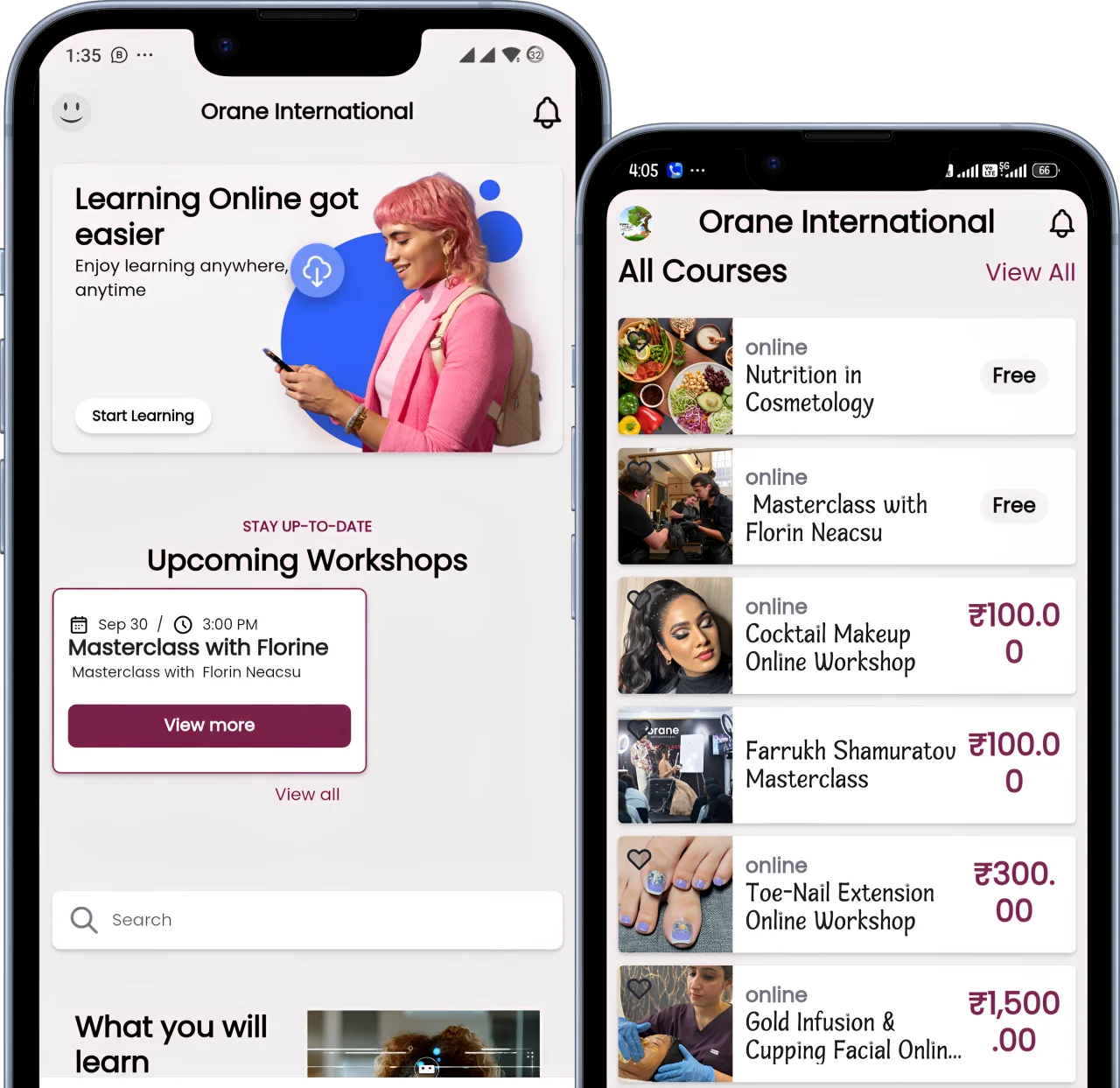Do you love coffee? It is likely you do since it is one of the most popular drinks in the world. People drink it in the morning to wake up, relax during breaks, or even stay focused at night. But is coffee good for your health? Or does it have too many side effects? At Orane International, we offer nutrition courses to help you understand food and drinks like coffee better. Many people—whether they care about health, study nutrition, or just want to feel good—get confused about coffee. Should you drink it every day? How much is okay? This blog will answer these questions with simple facts based on science. We’ll talk about the advantages and disadvantages of coffee and how it affects your body.
Our nutrition courses at Orane beauty and wellness academies teach you to make smart choices about what you eat and drink. Coffee is a big topic because it’s everywhere, but not everyone knows what it really does to your health. A professional nutritionist or resercher looks at studies and facts—not just rumors. So, let’s dive into this topic with clear, easy information to help you decide what’s best for you.
What Is Coffee and Why Do People Love It?

Coffee comes from beans that grow on plants. These beans are roasted, ground, and mixed with hot water to make the drink we know. It has caffeine, a natural chemical that wakes up your brain and body. According to the information provided by The Balance Coffee, as of 2023/2024, the global population stands at 8 billion, with 12.6% (approximately 1 billion people) consuming coffee daily. But why? It tastes good, gives energy, and feels like a warm hug in a cup.
But here’s the thing: coffee isn’t just about energy. It has good and bad sides. Knowing both can help you enjoy it without hurting your health. Let’s start with the good stuff—the positives of coffee.
Excellent Benefits of Coffee
Coffee has many health benefits when you drink it in the right amount. Here are some big ones, backed by science.
- Boosts Your Brain Power
Caffeine in coffee makes you feel awake and focused. A study in Psychopharmacology (2018) found that 1–2 cups of coffee can improve memory and attention. This is why students and workers love it. - Protects Against Diseases
According to the National Institutes of Health (NIH), moderate coffee consumption may actually reduce the risk of common neurodegenerative diseases, such as Alzheimer’s and Parkinson’s. It has antioxidants—small helpers that fight damage in your body. - Helps Your Heart
Drinking 2–3 cups daily might lower your heart disease risk. According to the American College of Cardiology, drinking coffee—especially two to three cups per day—may be linked to a reduced risk of heart disease and irregular heart rhythms. Coffee is linked to a healthier heart. But too much can be a problem—we’ll talk about that later. - Burns Fat and Boosts Exercise
Caffeine can help your body burn fat faster. According to Healthline, caffeine can enhance fat burning, with studies showing it may increase fat oxidation by up to 29% in lean individuals and around 10% in those with obesity. %. That’s why athletes sometimes drink coffee before training.
These coffee advantages sound great, right? But there’s more to the story. Let’s look at the disadvantages of coffee and its side effects.
Disadvantages of Coffee
Coffee is not perfect all the time for everyone, and drinking too much or at the wrong time can cause problems. Here are some coffee side effects or disadvantages you should know about:
- Trouble Sleeping
Caffeine keeps you awake. If you drink coffee late in the day, it can prevent you from sleeping well. According to the Sleep Foundation, the half-life of caffeine typically ranges from 4 to 6 hours but can vary between 2 to 12 hours depending on individual factors. Since caffeine can stay in the system for an extended period, consuming it too late may disrupt sleep quality, so avoid it after 2 p.m. and late at night if you are looking for an afternoon nap or after 10 p.m. - Makes You Nervous or Jumpy
Too much coffee can make your heart race or your hands shake. According to Medical News Today, consuming more than 400 mg of caffeine per day (approximately four cups of coffee) may lead to increased anxiety in some individuals. - Stomach Problems
Coffee is acidic, which means it can upset your stomach. According to Allied Digestive Health, caffeine can stimulate frequent contractions in the digestive tract and increase stomach acidity by promoting excess gastric acid production. Even a single cup of coffee can significantly impact the gastrointestinal system. - Addiction Risk
If you drink coffee every day, your body might start needing it. According to Healthline, caffeine withdrawal can affect anyone who regularly consumes caffeine and suddenly stops. Symptoms such as headaches, fatigue, low energy, irritability, anxiety, difficulty concentrating, depressed mood, and tremors can last between 2 to 9 days.
So, while coffee has benefits and side effects, it depends on how much you drink and when. Let’s see how it really impacts your health.
Coffee and Your Health: What Science Says
Is coffee good for health? The answer is both yes and no. It’s all about balance. Here’s how coffee affects your body, based on research:
- Good for Long Life?
According to the European Society of Cardiology, consuming two to three cups of coffee daily is associated with a longer lifespan and a reduced risk of cardiovascular disease compared to those who avoid coffee. But why? Coffee’s antioxidants fight inflammation, which is tied to ageing and sickness. - Bad for Some People
Not everyone reacts to coffee positively, and according to various scientific research, some people have genes that make caffeine hit them harder. For them, even one cup can raise blood pressure or cause stress. - Pregnancy Warning
The American College of Obstetricians and Gynecologists‘ (ACOG) recommends that pregnant women limit their caffeine intake to less than 200 milligrams per day. Too much might harm the baby.
The coffee’s advantages and disadvantages show it’s not black-and-white. A nutritionist would tell you to know your body and not overdo it.
How Much Coffee Is Safe?
If you are wondering about the safe consumption quantity of coffee, you can consider the U.S. Food and Drug Administration’s (FDA, 2023) suggestion. It recommends that 400 mg of caffeine daily is safe for most adults. That’s about 3–4 cups of brewed coffee. Kids and teens should avoid it, and pregnant women should stick to less. Here’s a quick guide:
- 1 cup (8 oz) brewed coffee = 95 mg caffeine
- 1 espresso shot = 65 mg caffeine
- 1 cup instant coffee = 30–90 mg caffeine
Listen to your body. If you feel jittery or can’t sleep, cut back.
Want to learn Nutrition? Learn More with Orane International
At Orane International, our nutrition courses help you deeply understand topics like coffee’s effect on health. We teach you how to balance food and drinks for a healthy life. Coffee can be part of that—if you know its benefits and side effects. A professional nutritionist uses science to guide you, not guesses. Want to learn more? Check out our nutrition courses and start making smart choices today.
Final Thoughts
Coffee is a friend to many, but it’s not for everyone. This blog focuses on both the good and bad effects of coffee. The advantages of coffee include better focus, a healthier heart, and disease protection. The disadvantages of coffee include sleep issues, anxiety, and stomach trouble. So, is coffee good for health? Yes, if you drink it wisely—2–3 cups a day is a sweet spot for most people.
Next time you sip your coffee, think about what it’s doing for you. If you’re curious about nutrition and want to join professional courses, join us at Orane International. We’re here to help you live better, one cup at a time.















